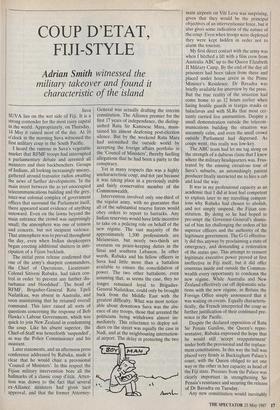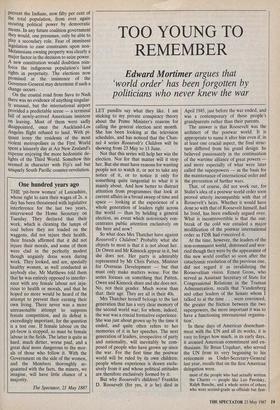COUP D'ETAT, FIJI-STYLE
Adrian Smith witnessed the military takeover and found it characteristic of the island
Suva SUVA lies on the wet side of Fiji. It is a strong contender for the most rainy capital in the world. Appropriately, on Thursday, 14 May it rained most of the day. At 10 o'clock in the morning Suva witnessed the first military coup in the South Pacific. I heard the rumour in Suva's vegetable market that RFMF troops had interrupted a parliamentary debate and arrested all ministers and their backbenchers. Groups of Indians, all looking increasingly uneasy, gathered around transistor radios awaiting the news of further developments. In the main street between the as yet unoccupied telecommunications building and the grey, inter-war colonial complex of government offices that surround the Parliament itself, there appeared scant evidence of anything untoward. Even on the lawns beyond the main entrance the crowd was surprisingly small; the atmosphere was one of tension and concern, but not incipient violence. That atmosphere was to prevail throughout the day, even when Indian shopkeepers began erecting additional shutters in anti- cipation of a Fijian backlash. The initial press release confirmed that one of the army's sharpest commanders, the Chief of Operations, Lieutenant- Colonel Sitiveni Rubuka, had taken con- trol in order 'to prevent any further dis- turbance and bloodshed'. The head of RFMF, Brigadier-General Ratu Epeli Nailatikau, was absent in Australia, and soon maintaining that he retained overall command. This later raised all sorts of questions concerning the response of Bob Hawke's Labour Government, which was quick to join New Zealand in condemning the coup. Like his absent superior, the Chief-of-Staff was henceforth 'suspended', as was the Police Commissioner and his assistant.
Later statements, and an afternoon press conference addressed by Rabuka, made it clear that he would chair a provisional `Council of Ministers'. In this respect the Fijian military intervention bore all the hallmarks of a classic coup d'etat. Atten- tion was drawn to the fact that several ex-Alliance ministers had given tacit approval, and that the former Attorney- General was actually drafting the interim constitution. The Alliance premier for the first 17 years of independence, the disting- uished Ratu Sir Kamisese Mara, main- tained his almost deafening post-election silence. But by the weekend Ratu Mara had astonished the outside world by accepting the foreign affairs portfolio in the 'Council of Ministers', thereby fuelling allegations that he had been a party to the conspiracy.
Yet in many respects this was a highly uncharacteristic coup, and riot just because it was taking place in a previously stable and fairly conservative member of the Commonwealth.
Intervention involved only one-third of the regular army, with no guarantee that all of the substantial reserve forces would obey orders to report to barracks. Any Indian reservists would have little incentive to take on a policing role on behalf of the new regime. The vast majority of the approximately 1,500 professionals are Melanesian, but nearly two-thirds are overseas on peace-keeping duties in the Sinai and southern Lebanon. In other words, Rabuka and his fellow officers in Suva had little more than a battalion available to ensure the consolidation of power. The two other battalions, even assuming that, as seems the case, they no longer remained loyal to Brigadier- General Nailatikau, could only be brought back from the Middle East with the greatest difficulty. What was most notice- able about downtown Suva was the abs- ence of any troops, those that arrested the politicians being withdrawn almost im- mediately. This reluctance to deploy sol- diers on the street was equally the case in Nadi, and at the neighbouring internation- al airport. The delay in protecting the two main airports on Viti Levu was surprising, given that they would be the principal objectives of an interventionist force, but it also gives some indication of the nature of the coup. Even when troops were deployed they were kept hidden in order not to alarm the tourists.
My first direct contact with the army was when I hitched a lift with a film crew from Australia ABC up to the Queen Elizabeth II Military Camp. By the end of the day all prisoners had been taken from there and placed under house arrest in the Prime Minister's Residence. Dr Bavadra was briefly available for interview by the press. But the true reality of the situation had come home to us 12 hours earlier when facing hostile guards in teargas masks or balaclavas and with SLRs that most cer- tainly carried live ammunition. Despite a small demonstration outside the telecom- munications building the situation was uncannily calm, and even the small crowd outside Parliament had dispersed. As coups went, this really was low-key.
The ABC team had let me tag along on the strength of a dubious claim that I knew where the military headquarters was. Frus- trated by the ensuing circuitous tour of Suva's suburbs, an astonishingly patient producer finally instructed me to hire a cab and lead the way.
It was in my professional capacity as an academic that I did at least feel competent to explain later to my travelling compan- ions why Rabuka had chosen to abolish, and not simply suspend, the Fijian con- stitution. By doing so he had hoped to pre-empt the Governor-General's dismis- sal of him for challenging the orders of his superior officers and the authority of the legitimate government. The G-G effective- ly did this anyway by proclaiming a state of emergency, and demanding a restoration of the status quo. This attempt to reassert legitimate executive power proved at first ineffective in Fiji itself, but it did offer countries inside and outside the Common- wealth every opportunity to condemn the new regime. While Australia and New Zealand effectively cut off diplomatic rela- tions with the new regime, in Britain the Foreign Office simply announced that it was waiting on events. Equally characteris- tically, the French interpreted the coup as further justification of their continued pre- sence in the Pacific.
Despite the declared opposition of Ratu Sir Penaia Ganilou, the Queen's repre- sentative, Rabuka expressed the hope that he would still 'accept reappointment' under both the provisional and the replace- ment constitutions. In this way the ball was placed very firmly in Buckingham Palace's court, with the Queen obliged to act one way or the other in her capacity as head of the Fiji state. Pressure from the Palace was clearly important in strengthening Sir Penaia's resistance and securing the release of Dr Bavadra on Tuesday.
Any new consititution would inevitably prevent the Indians, now fifty per cent of the total population, from ever again securing political power by democratic means. In any future coalition government they would, one presumes, only be able to play a secondary role. Fear of imminent legislation to ease constraints upon non- Melanesians owning property was clearly a major factor in the decision to seize power. A new constitution would doubtless rein- force the indigenous population's land rights in perpetuity. The elections now promised at the insistence of the Governor-General may determine if such a change occurs.
On the coastal road from Suva to Nadi there was no evidence of anything singular- ly unusual, but the international airport provided a predictable scene — a terminal full of newly-arrived Americans insistent on leaving. Most of them were sadly disappointed, once the Auckland-Los Angeles flight refused to land. With pi- quant irony the residents of the most violent metropolises in the First World spent a leisurely day at Air New Zealand's expense enjoying the more hedonistic de- lights of the Third World. Somehow this seemed in character with Fiji's sad but uniquely South Pacific counter-revolution.










































































 Previous page
Previous page